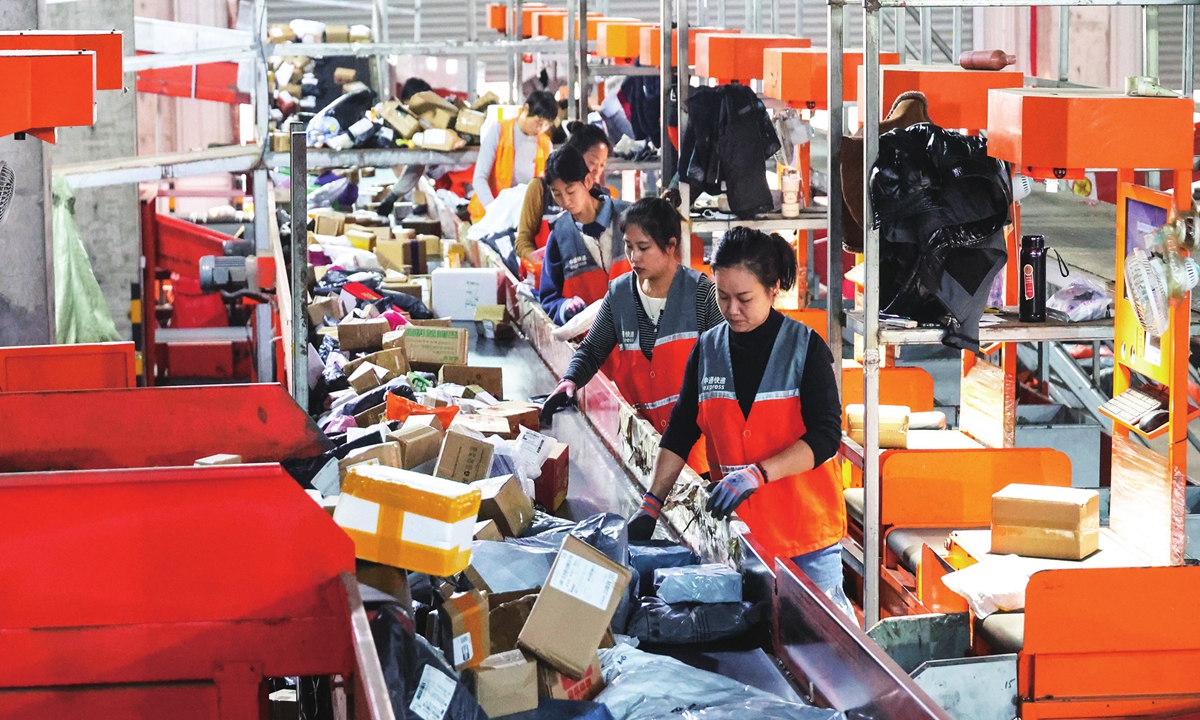
Staff members sort packages at a delivery center in Lianyungang, East China's Jiangsu Province on November 11, 2024, as the "Double 11" online shopping festival drives up the number of domestic packages. Photo: VCG
China's parcel delivery sector has broken another record, handling more than 150 billion parcels as of Sunday this year and surpassing the total volume for last year, official data showed on Monday.
The smooth delivery of hundreds of billions of parcels reflects the vigor and vitality of China's consumer market, which provides strong support for economic growth momentum in the fourth quarter, analysts said.
The astronomical figure means that every Chinese citizen gets more than 100 parcels on average a year - the first time that has happened. It's also a milestone in China's parcel delivery sector, which in 2014 handled over 10 billion parcels, according to data released by the State Post Bureau.
The surge in parcel volume comes as China's delivery network sees remarkable technological and operational advancements. Chinese e-commerce platforms and logistics firms are actively adopting advanced technologies such as unmanned vehicles and drones and intelligent sorting to increase efficiency and reduce costs.
Meanwhile, the development of the country's courier delivery sector is getting more balanced too, and the market share of parcels delivered in the central and western regions has continued to expand. Specialty products from regions such as Northwest China's Xinjiang Uygur Autonomous Region and Qinghai Province are being transported efficiently to households across the country, creating a unified national market network, said the State Post Bureau.
"The logistics industry is considered an artery and part of the basic infrastructure of a country's economy. The sustained growth of parcels delivered across the country embodies the stable and healthy development of the Chinese economy," Zhang Yi, CEO of the iiMedia Research Institute, told the Global Times on Monday.
This year, Chinese authorities have announced pro-growth measures to expand domestic consumption. Driven by policies promoting large-scale equipment upgrading and consumer goods trade-ins, the country's consumption has regained pace significantly. These efforts have shored up the momentum of the country's overall economic growth while driving robust expansion in the delivery sector, Zhang said.
According to data released by the National Bureau of Statistics on Friday, China's retail sales rose 4.8 percent year-on-year in October, quickening from a 3.2 percent increase in September, as sales of household appliances, furniture and automobiles were robust thanks to the national trade-in program.
As a package of incremental policies continue to produce effects, China's economy will consolidate its growth momentum in the fourth quarter, contributing to the achievement of full-year economic and social development goals, Cao Heping, an economist from Peking University, told the Global Times on Monday.
Driven by strong overseas demand, China's international delivery services are also expanding. The 100,000th China-Europe freight train departed from Southwest China's Chongqing Municipality on Friday morning, a milestone in the development of the service that facilitates economic and trade exchanges between China and Europe.
The international logistics system continues to improve, with Chinese logistics firms accelerating the construction of overseas distribution centers and warehouses and an expanding fleet of dedicated cargo planes, Chen Kai, deputy head of the State Post Bureau, said at a recent conference in Beijing.
The development of international delivery services actively contributes to Chinese industries going global, while bringing more choices for global consumers, Cao said. Backed by advanced technologies such as big data and cloud computing, the logistics industry will play a larger role in the country's economic transformation and upgrade and inject more vitality into the economic development of China and the world as a whole, he said.




